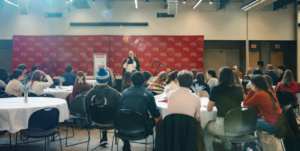Editorial
Spring is upon us, CU! Time to ditch the tights, switch to iced drinks instead of hot, and try to make CUAllies a university-recognized organization. Again. But hey, at least they’re tenacious.
While CUAllies trying to become an OCA-recognized organization is a tale as old as time, we’ll rehash it for the new kids anyways.
CUA used to have a group that supported LGBTQ+ issues but it was disbanded in the early 2000s. Since then, the latest iteration of the group, is CUAllies and they’re currently under a process to be recognized as a school sanctioned organization.
But, alas, being The Catholic University of America means there are some problems with that. After all, we’d hate to be Georgetown.
The Catholic Church has acknowledged that people feel sexual attraction to those of the same sex and that such attraction is unavoidable, it is the acting upon such sexual attraction that conflicts with the Church’s teachings.
No one can pretend to know the ins and outs of Theology, nor pretend to know the ins and outs of the politics that are concerned with governing a Catholic University. However, in the question of legitimizing CUAllies, we have to sort our priorities. CUA hasn’t yet declared CUAllies a club because drawing a line between supporting a cause and advocating for a cause is extremely difficult.
CUA continues to weigh support and advocacy against each other yet at the root of this issue is CUA ranking the Catholic Church’s sexual teaching above its social teaching.
Now let’s turn the tables and look at what CUAllies can do differently. CUAllies is given space in OCA to have their meetings and while they can’t request any speaker they want or pay for speakers through the Student Activity Fee, they can put in requests to have OCA bring a speaker and they can partner with SGA to put on events.
Really, the only reason they aren’t a club is because of the image it would present to the outside community if The Catholic University of America had a club that supported LGBTQ+ issues. But what about the difference between support and advocacy? If CUAllies had a written constitution, they could more clearly convey their mission. If CUAllies wants to be a club they should follow the procedures required of all other clubs on campus. Write a constitution, and based on a stated mission appeal to the university, instead of appealing to the university based on a mission that hasn’t yet been fully defined.
The fact of the matter is, CUAllies is going to exist whether or not the university decides to recognize them. As concerned as CUA is with public image, the administration should start worrying about how it’s going to play in the papers when the story is spun that CUA is denying support and denying love from the very students it’s supposed to protect.
Also, if CUAllies is an officially recognized organization OCA will be able to track their finances-and seeing how donations to the group are currently being held in members’ private accounts, having OCA involved with their financial standing could help prevent any coming issues.
The administration needs to recognize that CUAllies isn’t going away and that the need to create a space for LGBTQ+ students isn’t going away. CUAllies needs to recognize that the mission of their club–to support those students in need–is more important than geting Buzzfeed to tweet their petition.
Both sides need to work on understanding the motives of the other so that a compromise may eventually be reached and we can stop this yearly tradition









It’s despicable that in 2017, and with the Pope we have now, that getting a group like this funded on campus is *still* an issue. CUA will not get a dime of my alumni dollars until this happens.
The old Gay-Straight Alliance wasn’t disbanded, it fizzled out. During the last years of its existence, the VP for student life was the one filling out the paperwork to keep it alive. There were no meetings or events.